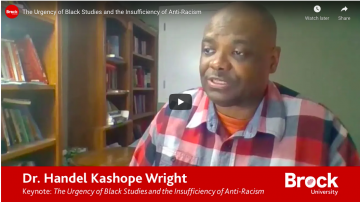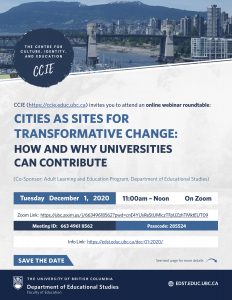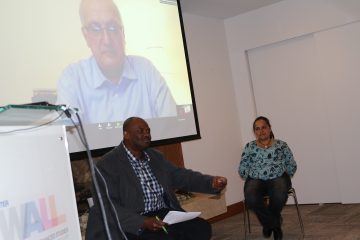The Urgency of Black Studies and the Insufficiency of Anti-Racism
Professor Handel Kashope Wright delivers the keynote at the Virtual Symposium: Activism and Solidarity Post-Script to the “Scholar Strike Canada” on October 29, 2020. Keynote Title: “The Urgency of Black Studies and the Insufficiency of Anti-Racism”.
The potential for Black Studies programs in Canada
Provost’s Speaker Series on Systemic Racism
Date: October 23, 2020
Building Black Studies in Canada: Moving beyond Anti-Racism Courses
Andrea A. Davis, Associate Professor, Department of Humanities, and Special Advisor on Anti-Black Racism Strategy, Faculty of Liberal Arts and Professional Studies, York University
Did Someone Say Black British Columbia? Rough Autobiographical Notes on Blackness and the Prospects of Black Studies at UBC
Handel Kashope Wright, Professor, Faculty of Education, and Director, Centre for Culture, Identity and Education, UBC Vancouver
African Canadian Response to the Pandemic and International Uprisings
People of African-descent have been hardest hit by current circumstances. Economic distress and unemployment has disproportionately affected this population in the West, and statistics show that more individuals of African descent have died from the virus than in most other populations. This month, as well, we have had to bear witness to the public lynching of George Floyd and the suspicious death of Regis Korchinski-Paquet in Canada. Two more names added to the long list of black people who continue to be targeted and/or killed by the police.
Watch: “Decolonizing Higher Education Internationally” (panel)
Decolonizing Higher Education Internationally
“The enduring educational challenges of setting horizons of hope beyond modern-colonial imaginaries” by Vanessa de Oliveira Andreotti (UBC)
“What Does it Take to Decolonize Palestinian Higher Education? ” by André Elias Mazawi
“Youth Activism and Academia as Public Sphere” by Handel Kashope Wright.









